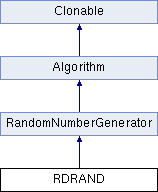Hardware generated random numbers using RDRAND instruction. More...
#include <rdrand.h>
 Inheritance diagram for RDRAND:
Inheritance diagram for RDRAND:Public Member Functions | |
| RDRAND () | |
| Construct a RDRAND generator. More... | |
| virtual void | GenerateBlock (byte *output, size_t size) |
| Generate random array of bytes. More... | |
| virtual void | DiscardBytes (size_t n) |
| Generate and discard n bytes. More... | |
| virtual void | IncorporateEntropy (const byte *input, size_t length) |
| Update RNG state with additional unpredictable values. More... | |
| std::string | AlgorithmProvider () const |
| Retrieve the provider of this algorithm. More... | |
 Public Member Functions inherited from RandomNumberGenerator Public Member Functions inherited from RandomNumberGenerator | |
| virtual void | IncorporateEntropy (const byte *input, size_t length) |
| Update RNG state with additional unpredictable values. More... | |
| virtual bool | CanIncorporateEntropy () const |
| Determines if a generator can accept additional entropy. More... | |
| virtual byte | GenerateByte () |
| Generate new random byte and return it. More... | |
| virtual unsigned int | GenerateBit () |
| Generate new random bit and return it. More... | |
| virtual word32 | GenerateWord32 (word32 min=0, word32 max=0xffffffffUL) |
| Generate a random 32 bit word in the range min to max, inclusive. More... | |
| virtual void | GenerateBlock (byte *output, size_t size) |
| Generate random array of bytes. More... | |
| virtual void | GenerateIntoBufferedTransformation (BufferedTransformation &target, const std::string &channel, lword length) |
| Generate random bytes into a BufferedTransformation. More... | |
| virtual void | DiscardBytes (size_t n) |
| Generate and discard n bytes. More... | |
| template<class IT > | |
| void | Shuffle (IT begin, IT end) |
| Randomly shuffle the specified array. More... | |
 Public Member Functions inherited from Algorithm Public Member Functions inherited from Algorithm | |
| Algorithm (bool checkSelfTestStatus=true) | |
| Interface for all crypto algorithms. More... | |
| virtual std::string | AlgorithmName () const |
| Provides the name of this algorithm. More... | |
| virtual std::string | AlgorithmProvider () const |
| Retrieve the provider of this algorithm. More... | |
 Public Member Functions inherited from Clonable Public Member Functions inherited from Clonable | |
| virtual Clonable * | Clone () const |
| Copies this object. More... | |
Static Public Member Functions | |
| static const char * | StaticAlgorithmName () |
Detailed Description
Hardware generated random numbers using RDRAND instruction.
- See also
- MaurerRandomnessTest() for random bit generators
- Since
- Crypto++ 5.6.3
Constructor & Destructor Documentation
◆ ~RDRAND()
◆ RDRAND()
| RDRAND::RDRAND | ( | ) |
Construct a RDRAND generator.
According to DJ of Intel, the Intel RDRAND circuit does not underflow. If it did hypothetically underflow, then it would return 0 for the random value. AMD's RDRAND implementation appears to provide the same behavior.
- Exceptions
-
RDRAND_Err if the random number generator is not available
Definition at line 287 of file rdrand.cpp.
Member Function Documentation
◆ StaticAlgorithmName()
|
inlinestatic |
◆ GenerateBlock()
|
virtual |
Generate random array of bytes.
- Parameters
-
output the byte buffer size the length of the buffer, in bytes
Reimplemented from RandomNumberGenerator.
Definition at line 292 of file rdrand.cpp.
◆ DiscardBytes()
|
virtual |
Generate and discard n bytes.
- Parameters
-
n the number of bytes to generate and discard
the RDSEED generator discards words, not bytes. If n is not a multiple of a machine word, then it is rounded up to that size.
Reimplemented from RandomNumberGenerator.
Definition at line 298 of file rdrand.cpp.
◆ IncorporateEntropy()
|
inlinevirtual |
Update RNG state with additional unpredictable values.
- Parameters
-
input unused length unused
The operation is a nop for this generator.
Reimplemented from RandomNumberGenerator.
◆ AlgorithmProvider()
|
inlinevirtual |
Retrieve the provider of this algorithm.
- Returns
- the algorithm provider
The algorithm provider can be a name like "C++", "SSE", "NEON", "AESNI", "ARMv8" and "Power8". C++ is standard C++ code. Other labels, like SSE, usually indicate a specialized implementation using instructions from a higher instruction set architecture (ISA). Future labels may include external hardware like a hardware security module (HSM).
Generally speaking Wei Dai's original IA-32 ASM code falls under "SSE2". Labels like "SSSE3" and "SSE4.1" follow after Wei's code and use intrinsics instead of ASM.
Algorithms which combine different instructions or ISAs provide the dominant one. For example on x86 AES/GCM returns "AESNI" rather than "CLMUL" or "AES+SSE4.1" or "AES+CLMUL" or "AES+SSE4.1+CLMUL".
- Note
- Provider is not universally implemented yet.
- Since
- Crypto++ 8.0
Reimplemented from Algorithm.
The documentation for this class was generated from the following files:
